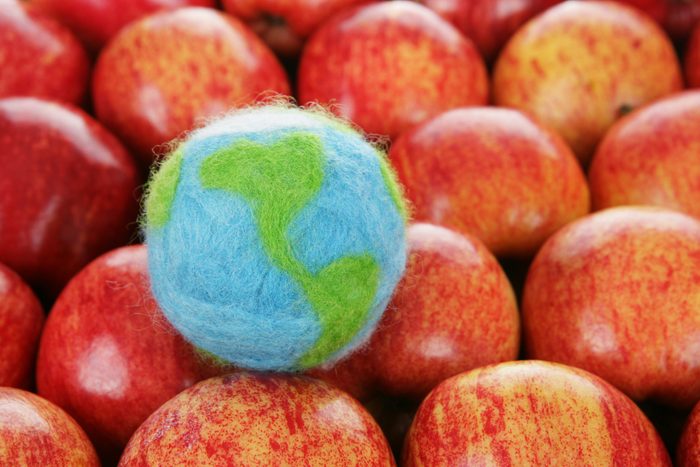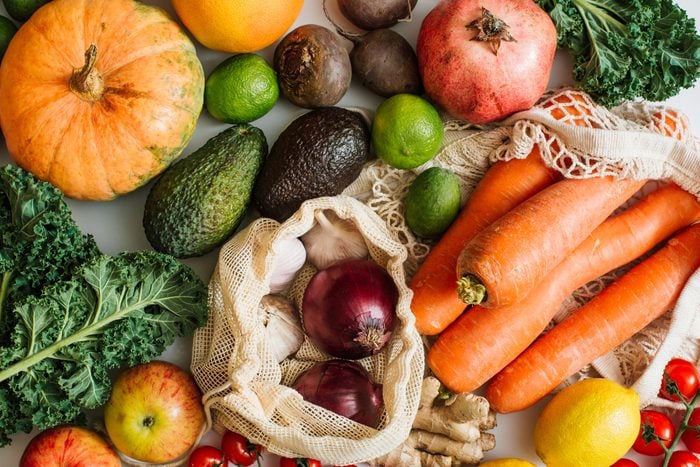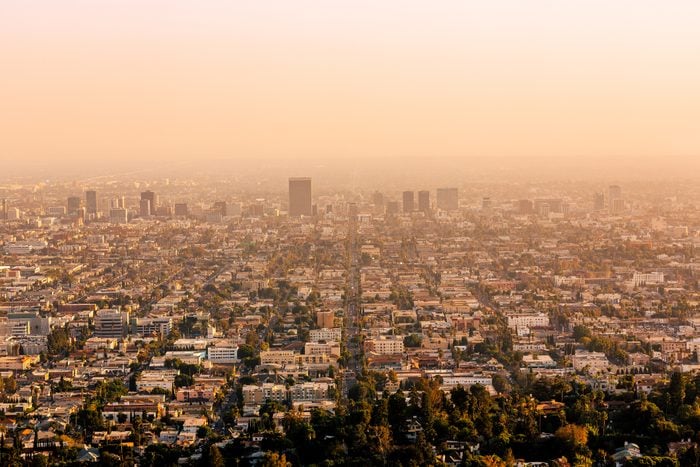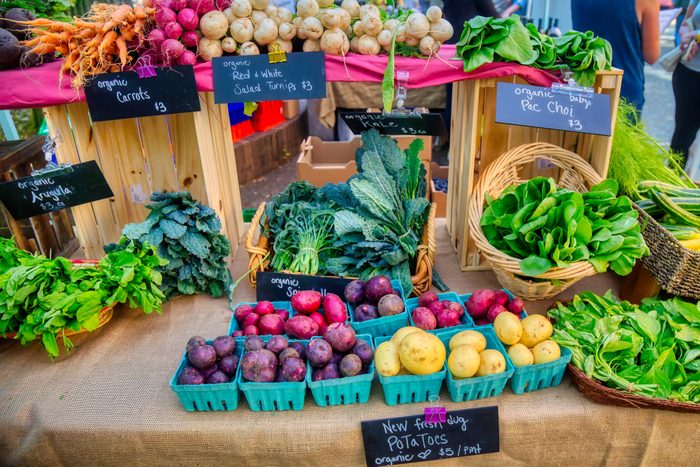
Climate change is weighing heavy on the minds of Americans. According to a 2020 survey of over 10,000 people by the Pew Research Center, 63% of respondents said they’d seen the effects of climate change in their local communities—and 65% thought more needs to be done to reduce that impact.
If it feels overwhelming to think about how you can make a difference in an issue so enormous, we’re here to make it easier. The Healthy @Reader’s Digest Sustainable Wellness Challenge is a week-long invitation to consider small changes in what you buy, what you eat, and even how you work out. These choices will improve health in your own world, as well as for the planet. If they make you feel better, that positivity could inspire others to try it.
Try The Healthy @Reader’s Digest‘s sustainable wellness challenge to really take a look at how your everyday choices can make Mother Earth—and yourself—healthier.

April 16: Make your diet eco-friendlier
According to the United Nations, about a third of all human-caused greenhouse gas emissions are linked to what we eat. Check out some Easy Tweaks to Eat More Sustainably.
Experts Say Most People Who Live to 100 Years Old Share This One Thing in Common

April 17: Buy sustainably
It’s easier than ever to buy sustainable products. According to a 2022 survey from retail technology solutions company Sensormatic, over half of 1,000 surveyed consumers said they would shop with a brand less frequently if they knew it wasn’t operating sustainably—and many companies are working hard to meet that standard.
Whether you’re in the market for a new yoga mat or are reconsidering the products you use for your period each month, all it takes is being mindful about the effects of at least one purchase to help make a difference.
This Beloved Superfruit Was Just Named One of the “Dirtiest” Groceries

April 18: Soothe your eco-anxiety
Does the dread of climate change ever overwhelm you? Do you feel helpless to make a difference? You might be struggling with eco-anxiety. “Eco-anxiety is used to refer to negative emotions experienced in the face of environmental problems, particularly grief, anxiety, or hopelessness,” says Susan Clayton, psychology chair at the College of Wooster in Wooster, Ohio, conservation psychologist, and an expert on how climate change affects emotional well-being.
Learn more about how eco-anxiety could be hurting your mental health—and what strategies you can use to manage it, one day (or one seven-day challenge!) at a time.
I’m a Psychotherapist—Here Are the 5 Keys to Letting My Stress Go

April 19: Know—and lower—your pollution risk
According to the World Economic Forum (WEF), the pollution the earth is facing is at unprecedented levels. WEF reports that 99% of the world’s population “experiences air pollution levels exceeding the World Health Organization’s guidelines.” Poor air quality is also now one of the three main causes of premature morbidity, causing almost seven million deaths in 2022.
That means it’s more important than ever to know your pollution exposure, such as whether you live in one of the states where lung cancer is most prevlant, with environmental factors playing a large role.
You could also be exposed to soil pollution, which experts say is a rising concern. “Although soil pollution is not as easily perceived as plastics in the oceans, it frequently has long-term impacts on human health and the environment,” says Ronald Vargas, a soil scientist and Secretary of the Global Soil Partnership for the FAO.
Make sure you’re aware of your risk so you’re able to do what you can to reduce it, including knowing the exact speed to walk to breathe in less air pollution.

April 20: Cut down on waste
According to the Environmental Protection Agency (EPA), each American produces about 5 pounds of trash a day. If you aren’t thinking about it, it’s easy for the little things you’re discarding to add up.
Try to practice mindfulness about your waste, and think about where you can cut back: Each year, the average American throws away approximately 415 Q-tips and goes through 141 rolls of toilet paper. Using a reusable Q-tip or installing a bidet toilet attachment could go a long way in helping the planet. You can also create new, delicious recipes by repurposing your food scraps.

April 21: Reduce your meat intake
In a 2022 study in The Lancet Planetary Health, Harvard University researchers analyzed the food intakes of over 65,000 people, and found that healthier, plant-based diets were better for the participants’ long-term health—and better for the environment. In particular, researchers said red and processed meats had the largest negative impact on the earth.
That doesn’t necessarily mean you have to cut meat out of your diet entirely if you want to help the planet. But whether you want to try a “reducetarian” lifestyle, check out a “flexitarian” diet, or you just want to have a “Meatless Monday” here or there, cutting back on your meat intake could have major impacts on your health and the health of Mother Earth.

Earth Day, April 22: Shop local
Helping the environment doesn’t have to be all about cutting back or cutting out certain choices. One of the best ways you can still enjoy your favorite foods while being kinder to the planet is looking for local produce. Check out if there’s a community-supported agriculture (CSA) program near you to get produce directly from regional farmers. Otherwise, just be thoughtful about how the produce you’re buying is getting to you; food that requires air transport, such as berries, green beans, sugar snap peas, and asparagus, can have a carbon footprint 50 times greater than food that travels by boat.
